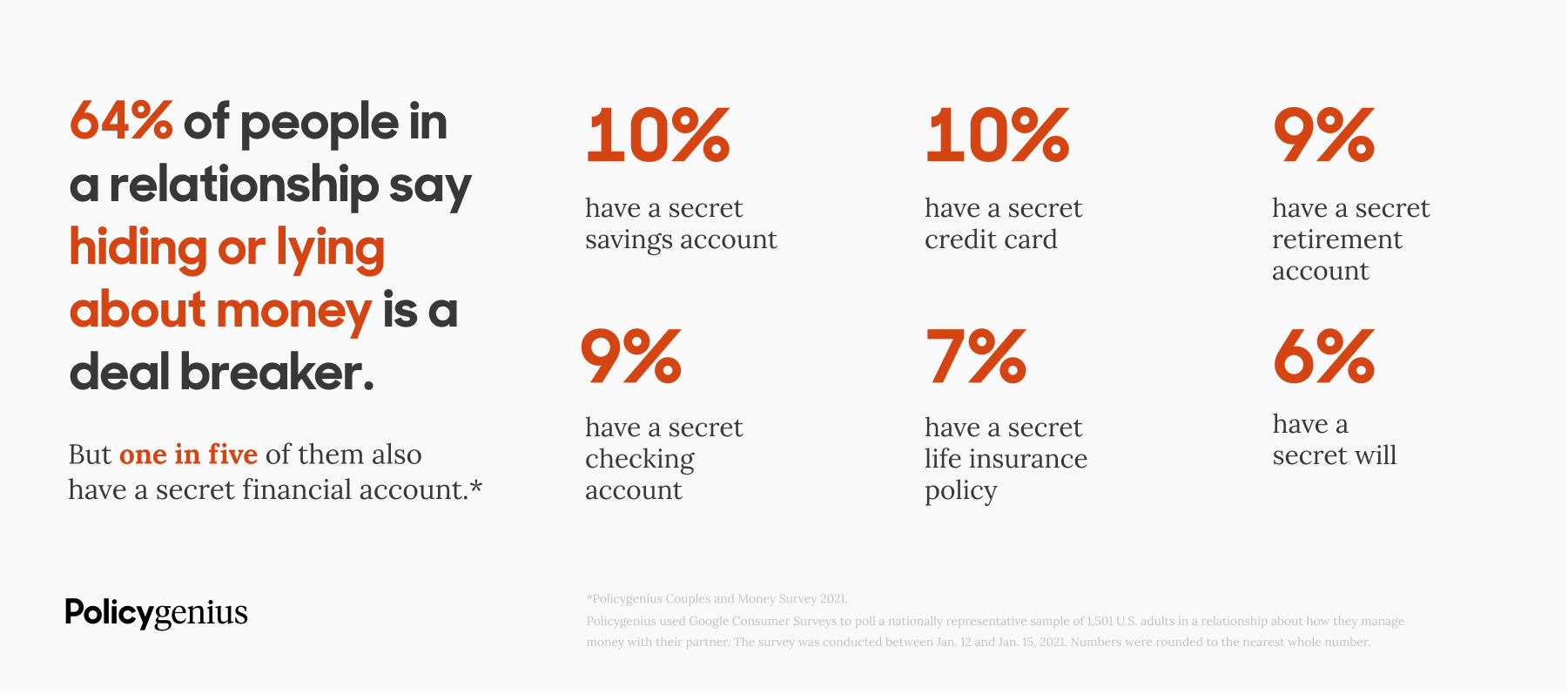The COVID-19 crisis has changed the way we consider our personal finances. Many Americans downsized their budgets, increased their savings and made big money decisions, like buying a home. But how did it affect the way couples did money together?
Policygenius’ third Couples & Money survey found that while over one in three people in relationships (34%) say the pandemic changed the way they managed money, most seem to handle money together the same way they have in the past. Around 40% say they manage money together and one in five (22%) say they manage money separately. These results are consistent with our previous surveys.
The survey also explored how couples handle financial infidelity. A majority of those in relationships, 64%, say lying or hiding money is a relationship deal breaker. But many are hiding money secrets of their own.

“When you say cheating, people often assume one thing,” said Nathan Astle, board member at the Financial Therapy Association. “But it could also mean emotional cheating, or even just lying about something you bought. If you don’t know what’s OK and what’s not, it can easily slide into deception and hurt.”
The phrase “financial infidelity” may conjure up an image of someone gambling away their family’s money. In reality it can take many forms, including lying about past debt, making secret purchases or even opening a hidden bank account.
There are many reasons financial infidelity occurs. Maybe someone has unresolved financial trauma or a conflicted relationship with money. Some people hide their purchases or debt from their partners due to shame or insecurity, said Ed Coambs, a financial therapist in North Carolina.
There’s no black or white reason why people lie or hide money, said Elle Martinez, founder of Couple Money, a personal finance blog and podcast.
“People think they aren’t harming anyone when they aren’t disclosing that purchase or ‘fun money’ account,” Martinez said. “They think it’s easier to not mention anything to their partner and avoid a fight, but these small things add up.”
Money can be difficult to discuss because it’s personal and often considered a conversation taboo, said Astle. Many couples avoid the topic altogether: Our survey found nearly one in five people in a relationship (17%) say they never discuss money with their partner.
The emotional impact of not talking about money can be significant. People may become more dishonest about their spending habits or even hide money from their partner, said Coambs. This can exacerbate tensions between you and your partner, leading to money arguments — or the end of your relationship. According to our survey, 16% of people consider their partner to be financially irresponsible.
“The problem is, avoidance doesn’t work in the long term,” Astle said. “It actually actively prevents couples from reaching financial security or safety in their relationship. If you have financial stress, that can be a catalyst for money arguments or divorce.”
Policygenius used Google Consumer Surveys to poll a nationally representative sample of 1,501 U.S. adults in a relationship about how they manage money with their partner. The survey was conducted between Jan. 12 and Jan. 15, 2021. Numbers were rounded to the nearest whole number.
Policygenius’ 2021 Couples and Money survey also found:
Many people don’t know financial information about their partners, including salaries (41%), debts (42%), investments (48%), retirement savings (49%), monthly spending (53%) and credit scores (54%). 20% of people knew none of these financial facts about their partners.
Almost 30% of people say they have paid off their partner’s debt. Of those, 44% have paid off more than $10,000 of their partner’s debt.
66% of people say money doesn�’t influence their relationship. Meanwhile, 2% plan to leave due to their money issues. Another 3% would leave their partner, but can’t afford to.
Are married couples better off?
Married couples may be better at doing money together than their non-married counterparts, likely because they have more “skin in the game,” said Astle.
Couples who are married typically have some understanding that their finances, including their debts, will combine. Being married means anything one partner does financially affects the other, said Astle. That’s why financial transparency and collaboration are crucial. Our survey supports this notion: Almost half of married people manage money together, compared to just 18% of unmarried people.

Tying the knot (and staying in the know financially) seems to strengthen relationships — a majority of married people (69%) say money doesn’t affect their relationship, compared to 56% of unmarried people.
What financial information do you know about your partner?
How couples can do money better together
There’s no one right way for couples to handle their finances together. You don’t necessarily need to go to the bank tomorrow and merge all of your accounts. But it helps to talk openly about the status of your financials — good or bad — and set goals for the future, said Coambs. Having an understanding of where your money stands and putting a solid plan in place can help you and your partner weather any financial storm, like a pandemic.
“It’s inevitable that you’re going to have differences of opinion. That’s true as gravity,” said Coambs. “But can you work through those differences? Financial stress strains your relationship security and safety, and it can be hard to have those productive conversations when you’re stressed.”
Here are other ways couples can handle their money together:
Have some empathy. Coambs advises his clients to take their partner’s perspective into consideration when having a money conversation. This will help you understand where they’re coming from, and help you both better address your problems together.
Make a plan. This includes building a budget that works for both you and your partner. Include fixed expenses (like mortgage payments) and discretionary spending, track how much you’re spending and adjust when necessary. Once you have a budget in place, begin considering longer-term goals, like buying a house or preparing for retirement.
Schedule regular money talks. Checking in with each other about money regularly (even if it’s just once a month) can help couples get on the same page and avoid negative surprises.
Visit a professional. Financial therapists can help couples have “difficult money conversations in a safe space,” said Astle. These therapists can help you make sense of financial friction in your relationship and set a game plan for the future.


